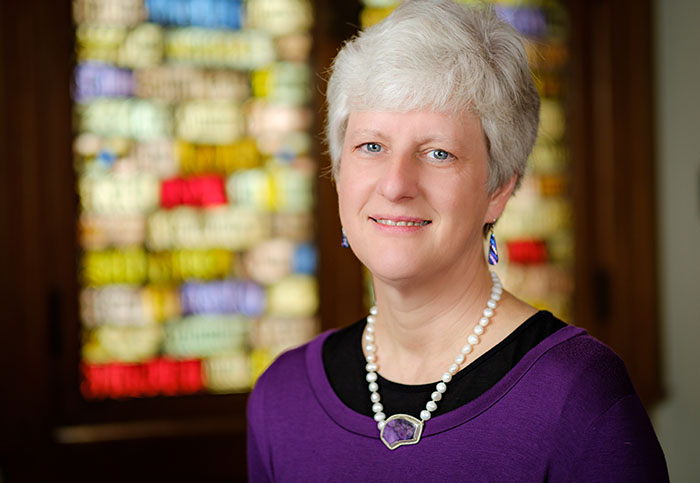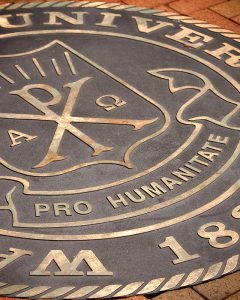
Wake Forest School of Divinity Professor Jill Crainshaw
May 7, 1860. Enslaved individuals were sold at auction to create a fund to educate Baptist ministers at Wake Forest College in Wake Forest, North Carolina.
May 7, 2019. Faculty, staff and students gathered on the steps of Wait Chapel to speak aloud the names of these persons who lived 159 years earlier and whose stories are not often recounted in our University’s public genealogy.
Isaac, Jim, Lucy, Pompie, Emma, Nancy, Harriet and child, Joseph, Harry, Ann and two children, Thomas, Caroline and Mary.
Through a service of remembering, we commemorated these ancestors and their descendants as vital testifiers in the cloud of witnesses that encircles our educational work. We acknowledged their memory as interwoven with our past, present and future identities as individuals. We acknowledged the testimony of their lives as fundamental to our identity as a University.
That ritual moment stretched me — heart, mind and body — toward a deeper and more radical understanding of Pro Humanitate, the University’s motto, than I had considered before then. I was challenged as I spoke those names aloud — all of us gathered there were challenged — to ask anew: What does it mean for a community of learning to be “for humanity,” the common translation of Pro Humanitate?
In 2012, then-Chair and Associate Professor of Classical Languages James Powell excavated the Latin roots of Pro Humanitate:
If we look at how the ancient Romans used humanitas, they never use it for “humanity” as a collective. Often it means “kindness”: the ability to show kindness is what defines us. But they also used it to point to human cultivation and learning: that is where they saw real humanness.
Kindness that is “for humanity” demands that we link our well-being to the well-being of others, even the most distant-from-us or different-than-us others.
If Pro Humanitate encapsulates ideals that guide our University, then our classrooms and co-curricular activities, our playing fields and community service sites, our office spaces and shared gathering places should all function together to encourage us — faculty, staff and students — to interrogate, explore and deepen how we understand and embody humanness.

Striking about the ancient Roman understanding of “humanitas” is the link between culture, or cultivation of learning, humanness and kindness. Kindness? What does cultivating kindness have to do with disrupting systems that degrade and demean people’s humanness?
Adam Phillips and Barbara Taylor write in “On Kindness” that genuine “kindness is hazardous because it is based on a susceptibility to others, a capacity to identify with their pleasures and sufferings.” This susceptibility to others extends beyond contemporary sentiments such as benevolence or altruism. Kindness that is “for humanity” demands that we link our well-being to the well-being of others, even the most distant-from-us or different-than-us others.
This means that being kind is about more than charitable acts or volunteer service, though such acts and service can be important to individual growth and communal transformation. To embody kindness that changes hearts and minds is to seek knowledge about what in our society degrades people’s humanness and then work to disrupt inhumane systems. To adopt a stance of radical humanness and thus radical kindness toward others is to acknowledge the full range of our communities’ histories, especially when those histories awaken us to times and places where people’s humanity has been exploited or maligned, and then to imagine ways to change the present and future.
Wake Forest is taking steps to examine its ties to slavery. This work is essential as our learning community reimagines what it means for our educational endeavor to be “for humanity.” Perhaps as we undertake this project we can rediscover and reclaim a more radical understanding of “kindness” than common usage of the word suggests.
At its root, “kindness” is connected to the word “kinship” — being “of a kind,” sharing a lineage with others. Kindness that arises out of and returns to our humanness reminds us that we are all kin to, connected in lasting ways to, each other.

A profound gift of this dimension of our motto is that as we live into Pro Humanitate we can develop habits of genuine kindness — dispositions of generosity and care — toward one another in our everyday tasks and actions such as offering gratitude to servers in campus dining halls or entertaining generous conversations across study tables about divisive contemporary issues. We can at the same time plumb the depths of art, sciences, histories, languages and religions to consider what constitutes human flourishing and reflect on our individual and communal callings to adopt a stance of fierce kindness toward and on behalf of all of our kin — neighbors near and far and this planet we call home.
A sacred text in my religious tradition urges believers: “Be ye kind to one another” (Ephesians 4:32). Today, I hear that text in a new way: “Be ye kindred to one another.”
When I was introduced to Isaac, Jim, Lucy, Pompie, Emma, Nancy, Harriet and child, Joseph, Harry, Ann and two children, Thomas, Caroline and Mary on May 7, 2019, I encountered people whose lives made possible my vocational journey. They are a part of my educational and professional lineage. They are a part of my own humanness. They are also part of our lineage as members of the Wake Forest University community. Our responsibility now is to honor their contributions to our identities by embodying Pro Humanitate — considering our humanness in all of its rich and troubling dimensions and taking up vocations through which we can exercise what might just be our most radical calling: “Be ye kindred to one another.”

Jill Y. Crainshaw (‘84) is Blackburn Professor of Worship and Liturgical Theology in the School of Divinity. She is also an ordained Minister of Word and Sacrament in the Presbyterian Church (U.S.A.). She is the author of five books, including “When I in Awesome Wonder: Liturgy Distilled from Daily Life” (Liturgical Press, 2017). Her book of poetry is “Cedars in Snowy Places: fifty-two poems.”


